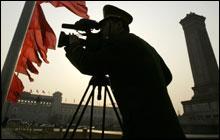Advertisement
China at the Movies

Once upon a time, in the Communist heyday of Mao Zedong, making movies in China was simple. You made the movies Mao wanted.
Now, the Chinese say they’re on the “sixth generation” of filmmakers since Mao’s time. And making movies is complicated. Filmmakers have to juggle official censorship and rampant piracy and new box office demands — and Chinese tastes and realities that are changing at light speed...
In the first decades after Chairman Mao, Chinese cinema made its international reputation with powerful, socially conscious art-house films like “Raise the Red Lantern” and “Farewell My Concubine.” Then came “Crouching Tiger, Hidden Dragon,” the huge box-office martial-arts adventure released in the U.S. in 2000, and suddenly costume blockbusters were all the rage.
Last year’s “Curse of the Golden Flower” was the most expensive movie ever made in China — all silk and kicks and palaces. But a new generation of films is making its mark, and we’re watching.
In this hour, we're talking about sex, blood, money and politics — we’re going to the movies, in China.
This hour was pre-recorded in Shanghai, and we'll have the full audio here on this page, but you can join the conversation right now. Post a comment below, and tell us what you think of Chinese films — and filmmaking in China — today.Guests:
Joining us in our studio in Shanghai is Chen Xihe, deputy dean in the School of Film, Television Art and Technology at Shanghai University.
And joining us from Vancouver is Ada Shen, an independent film producer and production consultant whose credits include "One Foot Off the Ground" and "The Painted Veil." She has written for Daily Variety, the entertainment paper, and the Chinese media blog Danwei.org.
Advertisement
And also with us in Shanghai is Joy Le Li, a film buff who has been advising us behind the scenes on our trip here.
Here are some recent Chinese films we talked about in this hour:
Still Life 三峡好人 by Jia Zhangke (China: 2006)
Still Life recounts the parallel journey of two city dwellers that travel to a rural village which has been demolished to make way for the water from the Three Gorges Dam. These two pilgrims, a miner and a nurse, have returned to the village to look for their lost spouses. The film was shot in Fengjie, a real town demolished and now flooded to make way for the Dam, and looks at some of the devastation and displacement caused by the massive construction project.
Tuya's Marriage 图雅的婚事 by Wang Quanan (Hong Kong: 2007)
Tuya lives in inner Mongolia with her disabled Husband Bater. Because of her husband's disability, Tuya must make all the money to support her family. Then she is diagnosed with a debilitating condition. Unable to earn money for her family, she and her husband decide to divorce so that Tuya can find a man to take care of her and her children.
The Warlords 投名状 by Peter Chan (China: 2007)The Warlords, starring Jet Li, Andy Lau and Takeshi Kaneshiro, is set during the Taiping Rebelion in 19th century China. With an ancient oath, three mercenaries become blood brothers, pledging to protect each other and die together, but imperial politics and the love of a woman tear them apart.
Curiosity Kills the Cat 好奇害死猫 by Zhang Yibai (China: 2006)
Curiosity Kills the Cat takes place in a city by the Yangzi River where there is a widening chasm between the elite rich and the poor. The story looks at the complex interplay between five characters living in the same apartment complex: a city woman, her husband, a manicure store owner, a security guard and a country girl. The film shifts its focus from character to character and jumps back and forth in time to give a textured look at life in modern China.
Lust, Caution 色,戒 by Ang Lee (Hong Kong: 2007)
During the Japanese occupation of Shanghai, a quiet university student Wong Chia Chi, is pulled into a plot to assassinate a top Japanese collaborator, Mr. Lee. She transforms herself into a glamorous socialite and successfully seduces Mr. Lee. But as the affair continues she increasingly loses her sense of self to the violence and passion of this new desperately physical relationship.
Lost in Beijing 苹果 by Li Yi (Hong Kong: 2007)
This urban melodrama looks at the uglier aspects of the new consumer culture of modern Beijing. Pingguo (Fan Bingbing) is a young foot masseuse married to the bad tempered window washer Ah-Kun. When Kun witnesses his wife raped by her boss, Mr. Lin (Tony Leung Ka Fai), he tries to attack and then blackmail the more powerful man. Then, when Pingguo discovers she is pregnant, her husband and her rapist see a neat solution to the mess: Mr. Lin will pay Kun for the baby if it is his.
Blind Mountain 盲山 by Li Yang (Hong Kong: 2007)
Naïve college student Bai Xuemei, played by Huang Lu, is tricked into traveling into the mountains of rural China where she was promised she would find medicinal herbs to sell for tuition money. When she reaches village, she realized she has been deceived and sold as a bride to a man in the village. Imprisoned in a dirty room, raped and beaten, Xuemei keeps trying to escape, refusing to accept her fate.
One Foot off the Ground 鸡犬不宁 by Chen Daming (China: 2006)
An old-fashioned Henan Opera group lives in an insular world of tradition, but when the troupe runs out of money, it is forced to disband. Unskilled in any trade except Henan opera, the members of the troupe each struggle make a living in modern society. Some find legitimate jobs, others find ways to survive on the black market.
This program aired on April 15, 2008.